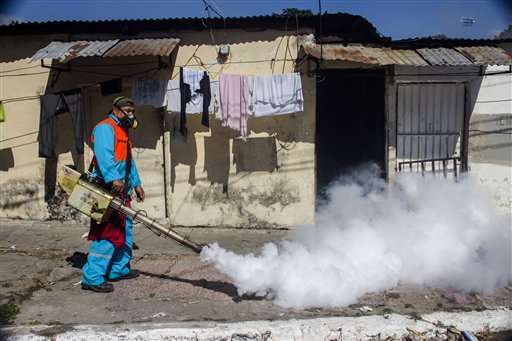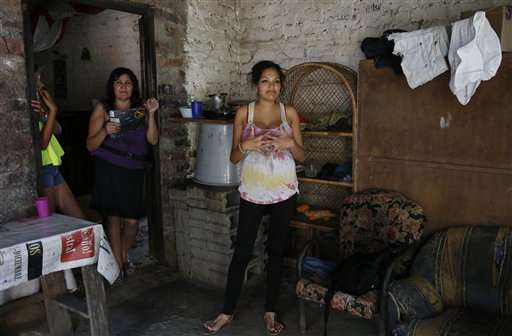A city worker fumigates to combat the Aedes Aegypti mosquitoes that transmit the Zika virus, at the San Judas Community in San Salvador, El Salvador, Tuesday, Jan. 26, 2016. Worries about the rapid spread of Zika through the hemisphere has prompted officials in El Salvador, Colombia and Brazil to suggest women stop getting pregnant until the crisis has passed. (AP Photo/Salvador Melendez)
The U.S. government is beginning research into a possible vaccine for the mosquito-borne Zika virus that is suspected of causing an unusual birth defect as it spreads in Latin America.
Don't expect protection anytime soon—vaccine development typically takes years.
"This is not going to be overnight," Dr. Anthony Fauci of the National Institutes of Health, said in an interview Tuesday.
But there are vaccines in various stages of development for other viruses in the same family—dengue, West Nile and chikungunya—that offer a pattern for creating something similar against Zika, said Fauci, who directs NIH's National Institute of Allergy and Infectious Diseases.
NIH researchers have begun some initial work, and the agency also plans to boost funding to some Brazilian scientists to accelerate Zika-related research, he said.
A health worker stands in the Sambadrome as he sprays insecticide to combat the Aedes aegypti mosquitoes that transmits the Zika virus in Rio de Janeiro, Brazil, Tuesday, Jan. 26, 2016. Inspectors begin to spray insecticide around Sambadrome, the outdoor grounds where thousands of dancers and musicians will parade during the city's Feb. 5-10 Carnival celebrations. Brazil's health minister says the country will mobilize some 220,000 troops to battle the mosquito blamed for spreading a virus linked to birth defects. (AP Photo/Leo Correa)
The Zika virus, first discovered decades ago in Africa, was long thought to be more of a nuisance illness, with symptoms generally much milder than its cousin dengue. But amid a large Zika outbreak in Brazil, researchers began reporting an increase in a rare birth defect named microcephaly—babies born with abnormally small heads. While scientists try to prove if Zika is the cause, the U.S. Centers for Disease Control and Prevention has advised pregnant women to reconsider travel to Brazil and 21 other countries and territories with outbreaks.
If a Zika vaccine eventually were developed, it's not clear how widely it would be used.
Kerly Ariza, 17 and 20-weeks-pregnant, right, stands at her home in Ibague, Colombia, Tuesday, Jan. 26, 2016. Ariza was diagnosed with clinical symptoms of the Zika virus at a local hospital and is awaiting for the results of laboratory tests. Minister of Health Alejandro Gaviria said that at least 16.000 people have already been already infected with the Zika virus in Colombia, among them more than 500 pregnant women. (AP Photo/Fernando Vergara)
© 2016 The Associated Press. All rights reserved.























